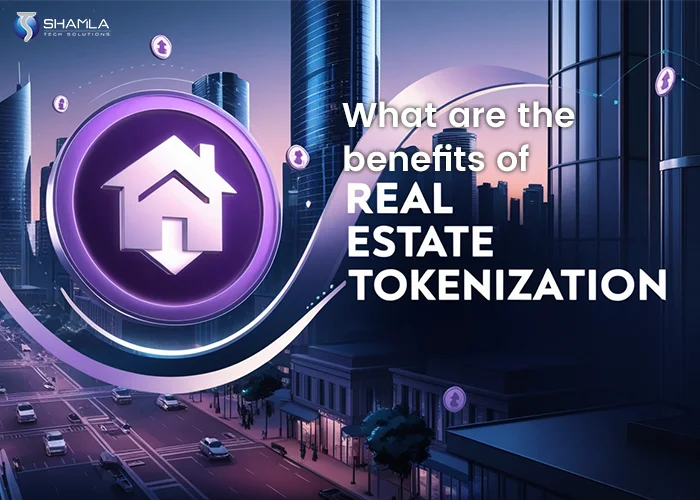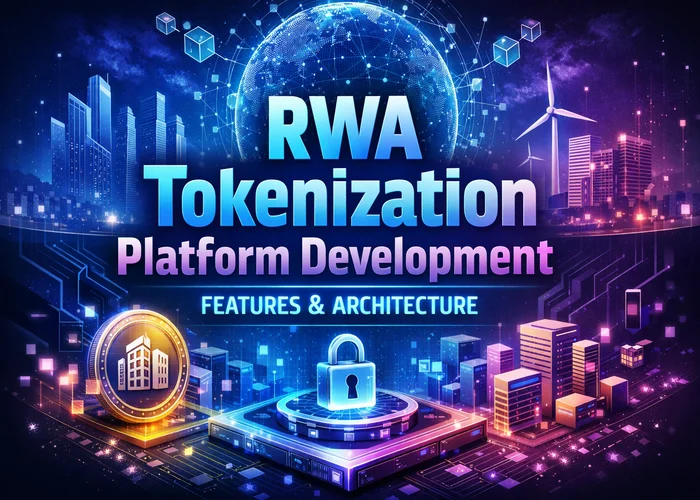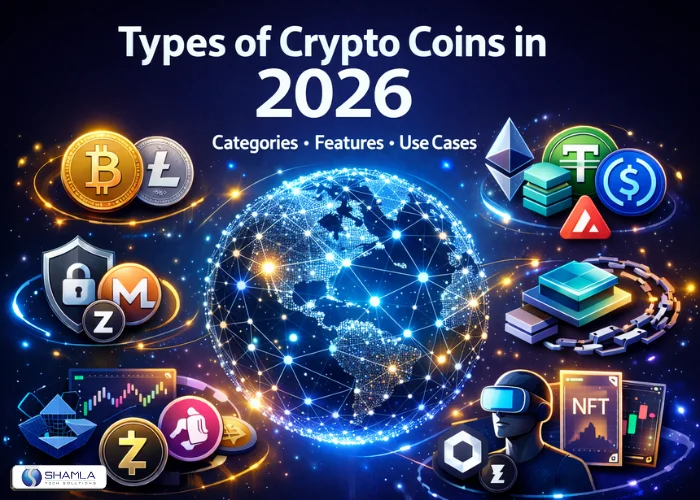The benefits of Real estate tokenization is changing investment options using blockchain technology. This unique technique allows investors to own fractional properties, improving real estate market accessibility, liquidity, and transparency.
Tokenized real estate expands the investor base, streamlines transactions, and ensures safe, unchangeable records by transforming actual assets into digital tokens.
This essay examines how tokenized real estate is changing investment. We will also discuss blockchain and tokenized real estate benefits.
Benefits of Real Estate Tokenization
Here are some of the benefits of real estate tokenization; reading this can help them understand how the asset tokenization platform benefit investors
Improved Access
Many possible investors find traditional benefits of real estate tokenization investing unattainable, as it sometimes calls for significant money. Tokenization lets investors buy fractional interests of properties, hence reducing this barrier. This democratization of investing broadens participation and allows more people to gain from real estate market expansion by allowing those with less money to engage in real estate.
Greater liquidity
Traditionally, real estate is an illiquid asset category. Without major time and expense, it might be difficult to rapidly buy or sell homes. Tokenization solves this problem by allowing property share trading on secondary markets. This enhanced liquidity, the major benefits of real estate tokenization, gives investors more freedom and access to their invested capital by allowing them to buy and sell their tokens with relative ease.
Transparency and Security
Underpinning the benefits of real estate tokenization, blockchain technology provides unmatched openness and security. An unchangeable ledger records every transaction and ownership transfer, hence lowering the possibility of fraud and conflicts. By allowing simple ownership and transaction history verification, investors can foster confidence in the investing process.
Economic Efficiency
The conventional real estate transaction procedure is one including several middlemen—brokers, attorneys, and banks—each of whom increases the cost and complexity.
By means of smart contracts, tokenization simplifies this process by automating many of these tasks, hence eliminating the need for middlemen and cutting transaction costs. This efficiency results in faster transaction times and cost reductions for investors.
Diversification of portfolio
By buying fractional shares of several assets spread across several areas and sectors, tokenization allows investors to grow their holdings. As investors, benefits of real estate tokenization are not dependent on the performance of a single asset; this diversification increases the possibility for returns and distributes risk. Owning a range of property tokens helps investors to create a more stable and diversified investment portfolio.
Streamlined Administration
Managing real estate investments may be difficult and time-consuming. Benefits of real estate tokenization offers a digital platform where investors may simply control their property holdings, hence simplifying this. From one interface, this comprises tracking performance, getting rental income, and engaging in decision-making processes. Smart contracts help to automate administrative chores, therefore lessening the management load on investors.
Global Investment Opportunities
By letting investors buy tokens symbolizing assets in other nations, real estate tokenization creates worldwide investing possibilities. This geographical diversification gives investors access to a larger high-growth market and allows them to benefit from worldwide real estate trends. It also offers a means for foreign investors to put money into markets once unreachable because of legal or logistical constraints.
Passive Income and Fractional Ownership
The Benefits of real estate tokenization enable fractional ownership, hence letting investors possess pieces of high-value properties that could otherwise be out of reach. Distributed proportionally to token holders, rental yields under this ownership model can generate passive income. Asset tokenization platforms benefit investors who can profit from real estate revenue without the obligations and complications of total property ownership.
The Role of Blockchain in Real Estate Tokenization
Blockchain serves as the basic technology for the benefits of real estate tokenization, delivering numerous significant advantages:
1. Security
Blockchain’s decentralized and immutable nature ensures that transactions are secure and tamper-proof. Each transaction is documented on a distributed ledger. This decreases the danger of fraud and increases confidence among participants.
2. Transparency
All transactions and ownership records on a blockchain are visible and easily verifiable. This openness creates a transparent audit trail for all property transactions and helps to reduce conflicts.
3. Effectiveness
Blockchain simplifies the purchasing, selling, and trading of real estate assets. Blockchain increases the efficiency of the whole process by cutting transaction times and costs through removing intermediaries like brokers and agents.
Technical Challenges of Real-Estate Tokenization
The truth is that several obstacles still stand in the way of tokenized real estate becoming widely used, and its actualization is still some distance off. Although there have been a few tries at tokenized real estate so far, none have yet been able to provide a scalable solution addressing the issues and constraints of the benefits of real estate tokenization.
Verification and Data Authentication
Whether it’s data on property ownership, data on property improvements and repairs, or other sorts of mission-critical data required for digital real estate transactions, there must be a certain degree of certainty that the data supplied is accurate, trustworthy, and genuine.
Wallet Recovery
Lorem ipsum dolor sit amet, consectetur adipiscing elit. Ut elit tellus, luctus nec ullamcorper mattis, pulvinar dapibus leo.
Imagine your house deed as an NFT kept in your digital wallet. You alone know the password. That also implies, though, that should you forget or lose the password, hence losing access to the wallet and the house deed NFT, you lose the house.
One difficulty in harmonizing the physical and digital connection between tokens and the underlying property is determining who has the final power to determine which company or individual owns a property in case of errors or fraud. Losing a token should not imply losing the ownership of a house. A more probable answer, then, is that a centralized organization—like a government—could assist in recovering and approving a new, reissued NFT to replace your house deed. This is comparable to what occurs now if you misplace a tangible house deed.
Large-Scale Implementation
Though there are many unanswered issues about how tokenization could operate globally or even on a national level, tokenized real estate offers great promise to release liquidity and simplify operations for buyers and sellers.
Changing the backend architecture and processes of a $29T market is not simple. Any effective large-scale real-estate tokenization will call for open standards, a great deal of testing and pilot programs, and the coordinated efforts of Web3 projects, governments, and companies all combined.
What Kind of Real Estate Property Can Be Tokenized?
Here are some of the real estate properties that can be tokenized. Let’s explore the benefits of token development.
Residential Property Tokens
Tokenizing residential properties lets you access fractional ownership, hence drawing more investors with fewer resources. This creates possibilities to sell segments of high value and the benefits of asset tokenization, hence boosting liquidity and releasing cash flow. Tokenization turns your home properties into a profitable, varied revenue source, making real estate investments more reachable.
Commercial Real Estate
Tokenizing commercial properties changes assets into digital tokens, hence increasing liquidity and facilitating the sale of fractional ownership interests. This strategy creates more investment possibilities, hence enabling you to draw a larger spectrum of investors. Tokenizing your commercial real estate helps you to maximize asset value, diversify income sources, and improve profitability.
Vacation Property Tokens
Tokenizing timeshares and vacation properties lets you provide partial ownership, hence increasing the appeal and liquidity of these investments. This expands the market to more consumers, hence boosting sales prospects and producing better profits. Tokenization guarantees consistent income and investment growth by means of more efficient monetization of high-demand vacation assets.
Industrial Property Tokens
Tokenizing industrial properties—warehouses and factories, for example—allows fractional ownership, hence facilitating investor access to these assets. This approach boosts liquidity and lets you more readily sell parts of your property. Tokenizing industrial real estate lets you create new income sources, spread investments, and improve the general worth of your assets.
Agricultural Land Tokens
Tokenizing agricultural land facilitates fractional ownership, hence enabling the attraction of investors looking for consistent returns and development possibilities. This approach boosts liquidity and lets you more efficiently sell agricultural assets. Tokenizing agricultural assets allows you to access fresh income sources and help investments in sustainable farming.
Infrastructure Project Tokens
Attracting many investors helps to fund infrastructure projects like bridges and utilities by use of tokenization. Fractional ownership lets you generate capital more quickly by increasing liquidity. Tokenization guarantees consistent income and helps to develop and maintain important public projects by offering a novel means to profit from infrastructure assets.
Affordable Housing Tokens
Tokenizing affordable housing draws the money required for building by allowing fractional ownership. This strategy increases your pool of investors, which helps to finance necessary housing projects. Tokenization helps you to create consistent, long-term income while supporting community development and meeting the rising need for affordable housing.
Property Management Tokens
Tokenizing property management operations improves efficiency and transparency, enabling you to streamline rental income, maintenance, and related tasks. More investors are drawn to fractional ownership, which increases liquidity and returns. Tokenizing property management helps you to maximize operations, cut expenses, and create more revenues from your real estate holdings.
Tokenized Real Estate Funds
Tokenizing real estate funds lets you combine assets into digital tokens, so providing varied investment possibilities. This approach increases liquidity and allows smooth buying, selling, and trading of shares in a varied portfolio. Creating tokenized funds will help you to maximize profits, reduce risks, and draw a larger spectrum of investors to your real estate holdings.
Emerging Models of Real Estate Tokenization
Real world asset tokenization development is the fast-paced technology that emerges as the futuristic innovation in real estate.
Equity Tokens
Invest in real estate with equity tokens after knowing the benefits of real estate tokenization. Direct ownership rights in properties let you to earn rental income and capital appreciation with these tokens. Ideal for investors seeking long-term growth in real estate.
Debt Tokens
Invest confidently in debt tokens, which resemble mortgages or real estate bonds. These tokens provide investors a stable, fixed-income option with property-backed interest payments until the loan’s expiry.
Asset-backed tokens
Invest directly in real estate with asset-backed tokens connected to single properties or diverse portfolios. One benefits of real estate tokenization is for individuals seeking direct property market exposure; this simple investment gives real estate ownership.
Utility Tokens
Use utility tokens to interact with real estate. These tokens give you access to premium facility use or unique community features in a property development, improving your property experiences.
Tokens for revenue share
Use revenue share tokens to benefit from the continuous success of properties. These tokens give investors a steady income stream from property rental earnings without complete ownership.
Hybrid Tokens
Hybrid tokens combine equity, debt, and utility assets for a versatile investment. These coins offer investors diverse exposure with equity growth, income stability, and practical benefits.
REIT tokenization
Our REIT tokenization services turn REIT shares into digital tokens, increasing liquidity and lowering transaction costs. Our platforms let investors exchange these tokens using blockchain’s transparency and efficiency.
Preservation Tokens
Invest in preservation tokens to restore historic sites and buildings. These tokens assist cultural preservation and provide financial rewards through government incentives and tourism money.
Leasehold Tokens
Leasehold tokens allow rental income without ownership. For constant commercial or residential lease returns, these tokens facilitate earning through direct property administration.
Conclusion
Blockchain-powered real estate tokenization is changing investment by improving accessibility, liquidity, transparency, and efficiency. Investors can enjoy fractional ownership, global diversification, and cost-effective property management. Tokenization removes obstacles, making real estate investing more accessible and dynamic for new investors.
Benefits of real estate tokenization have great promise despite data authentication, wallet recovery, and scalable infrastructure issues. Benefits of tokenization in real-world assets enable new investment models for residential properties and infrastructure projects.
As the real estate industry embraces digital transformation, now is the moment to consider tokenization for your investment strategy.








